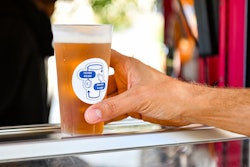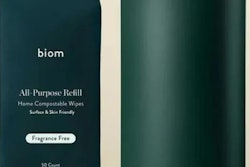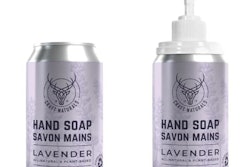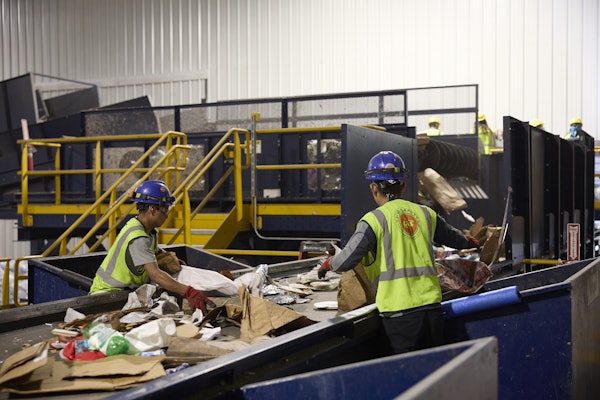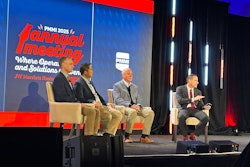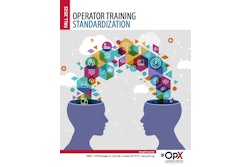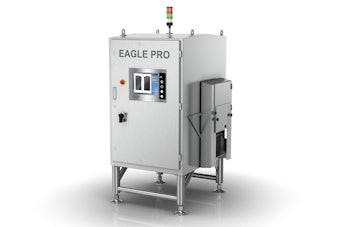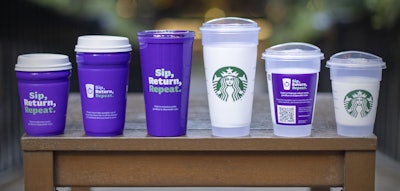
Last month, Starbucks, along with The Coca-Cola Company, PepsiCo, Peet’s Coffee, Yum! Brands, and other global and local brands and restaurants in Petaluma, Calif., launched The Petaluma Reusable Cup Project, the first citywide initiative to make reusable to-go cups the default option across multiple restaurants in a U.S. city. The project, which runs through early November, is being funded by the NextGen Consortium, led by the Center for the Circular Economy at Closed Loop Partners, and is focused on supporting customers to create return habits—a key factor to the success of reuse, according to the consortium.
The test involves more than 30 restaurants, eight of which are Starbucks stores or licensed Starbucks cafes in Target and Safeway. “Unlocking consumer behavior change on reusables with ease and convenience is key to advancing sustainability goals,” says Beth Nervig, senior manager, social impact communications for Starbucks. “We’re out front leading the retail industry on a cultural shift toward reusables, but we know we can’t do it alone.
 | Read this related article on Starbucks’ sustainable packaging efforts, “Starbucks: Bring Your Own Cup to Reduce Single-Use Packaging” |
“In Petaluma, our current test in partnership with the NextGen Consortium will assess how engaging consumers with reusable cups as the default option across 30-plus businesses affects single-use cup reduction and its potential for broader application.”
For all stores in the test, purple reusable cups will be the default option for all available sizes, with no deposit required. According to Closed Loop Partners Center for the Circular Economy Senior Director Carolina Lobel, “While deposit and penalty schemes can be effective, they may introduce friction and pose accessibility and operational challenges. By making reusable items the community standard without requiring deposits or imposing penalties, the program aims to seamlessly integrate sustainable practices into everyday life.”
The reusable cups and lids being used for Starbucks’ hot and cold beverages are made from polypropylene and are designed to be reused multiple times, with the exact number of reuses varying depending on handling and cleaning conditions. Cups that end up in the recycling bin are being recycled by local materials recovery facility Recology.
 Community ads support the understanding and adoption of the reusable cup program.
Community ads support the understanding and adoption of the reusable cup program.
On the back of each reusable cup is a “Sip, Return, Repeat” message and icon, accompanied by a QR code that Nervig says serves a dual purpose. “The QR code on the cup provides consumers with access to information about the program and return options, while also facilitating the logistics of returning the cup,” she explains. “Each QR code acts as a unique serial number, enabling the NextGen Consortium to track and analyze the cup’s journey from the point of sale to its return. This data is instrumental in optimizing and scaling up the reuse systems effectively.”
Customers in Petaluma will be able to return their empty reusable cups to any of the 60 return bins located throughout the city in convenient, high-traffic points and community hubs, or they can request home pickup. For those cups deposited in the bins, returnable platform provider Muuse is handling reverse logistics, washing, and redistribution. Lobel says that Muuse has a proven history with open-system reuse models around the world and has the necessary infrastructure in the Petaluma area, including a cup washing center less than an hour from the city, to support the initiative.
A 2023 reusable cup test by Starbucks in Napa and Petaluma helped guide the return process. “Last year, our test in Petaluma showed some customer confusion with new bin technology and limited bin locations,” shares Nervig. “This year, with the help of NextGen Consortium and Closed Loop Partners, we’ve introduced simpler bins, clearer signage, and over 60 bins across Starbucks stores and participating businesses to enhance ease of use. Additionally, community ads will support the understanding and adoption of the reusable cup program.”
Participating stores will be offering the reusable cups through Oct. 28, with the return bins available through Nov. 11. “Over the three-month trial period, we anticipate distributing and tracking a significant number of reusable cups across the eight participating Starbucks stores. The exact number will depend on customer participation rates, but we aim to gather substantial data to inform future scalability,” says Nervig. “Across the entire system of 30 restaurants, we expect to see a similar scale of usage, providing a comprehensive overview of the program’s impact.”
 | Read this related article about Starbucks’ 2023 reusable cup pilot in Napa and Petaluma, Calif., “Starbucks Pilots Reusable Foodservice Packaging Program” |
According to Lobel, during the trial, robust quantitative and qualitative research methods will capture return data and insights across different types of cups and locations, enabling the NextGen Consortium to measure and gather data on the environmental benefits of reuse in practice. She adds that after the trial period, “the Consortium will analyze and publish the results to inform scaleup of reuse systems in Petaluma, Sonoma County, and beyond.” PW


